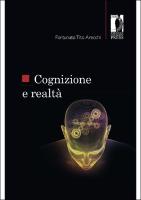Cognizione e realtà
| dc.contributor.author | Arecchi, Fortunato Tito | |
| dc.date.accessioned | 2022-05-31T10:30:58Z | |
| dc.date.available | 2022-05-31T10:30:58Z | |
| dc.date.issued | 2018 | |
| dc.identifier | ONIX_20220531_9788864537467_758 | |
| dc.identifier | OCN: 1229466095 | |
| dc.identifier.issn | 2704-5919 | |
| dc.identifier.uri | https://library.oapen.org/handle/20.500.12657/55474 | |
| dc.language | Italian | |
| dc.relation.ispartofseries | Studi e saggi | |
| dc.title | Cognizione e realtà | |
| dc.type | book | |
| oapen.abstract.otherlanguage | Cognition implies perception and judgement. Perception consists in interpreting a sensory stimulus: it is a common process in every animal with a brain, and can be described as a Bayesian inference where the interpretive algorithm is stored in long-term memory. Judgement, on the other hand, is related to the comparison between two perceptions which are coded in a language, in that short-term memory presents the first perception once again and compares it with the second. This operation is called inverted Bayes’ theorem and while it does not presuppose an algorithm, it builds a new one using comparison. The book shows how the algorithmic leaps related to linguistic operations capture aspects of reality which cannot be reached through Bayesian chains of inference following the same algorithm. Nowadays, we experience the successes of Artificial Intelligence (AI), which, however, works thanks to a direct Bayes’ theorem and speeds up recursive chains, but does not resort to algorithmic leaps; therefore, it does not contribute to human language. | |
| oapen.identifier.doi | 10.36253/978-88-6453-746-7 | |
| oapen.relation.isPublishedBy | bf65d21a-78e5-4ba2-983a-dbfa90962870 | |
| oapen.relation.isbn | 9788864537467 | |
| oapen.relation.isbn | 9788864537450 | |
| oapen.relation.isbn | 9788892730939 | |
| oapen.series.number | 191 | |
| oapen.pages | 150 | |
| oapen.place.publication | Florence |

